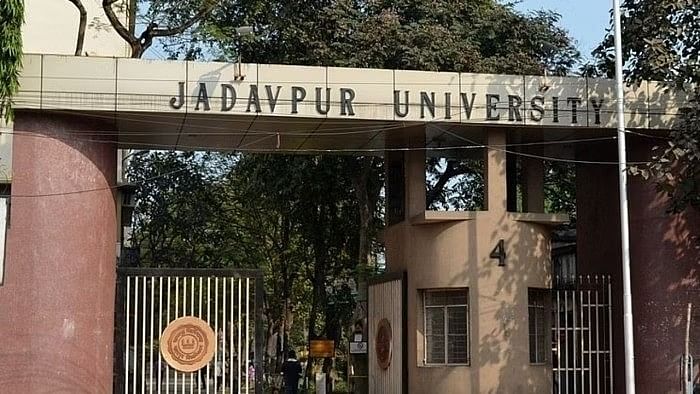
The main gate of Jadavpur University.
Credit: Wikimedia Commons.
Tagore once said, “I do not remember what I was taught; I only remember what I learned. What our students are learning in classrooms, on university campuses, in hostels, and in libraries dismays us, as does the news from the very land of Tagore and Santiniketan. A bright and young student, Swapandeep, lost his life at Jadavpur University to the menace of ragging done under the garb of ‘initiation’ and ‘intro’.
Initiation into education, the education system, and the institution could never be more barbaric than this. Bengal and Bengali society are considered more enlightened and civilised in comparison to northern Indian states. Even the NIRF ranks and NAAC grading place Jadavpur University in the top echelons among universities and higher education institutes. Education and the educational system of such merit are expected to evolve their learners in humane harmony and not into fragmented individuals who wish to attain ‘excellence’ in pay packages and cut-throat competition only. Education has been defined as a catalyst for civilising humans. It is believed that we are born barbaric and uncouth, and it is education that prepares us to live with ‘others, or with people that do not belong to our gild or tribe. Given the chance, Swapandeep’s parents would have preferred their son to remain illiterate rather than die for his ambition to study Bengali literature.
It is reported that Swapandeep was made to run naked in the corridors of the hostel, and homosexual slurs were hurled at him. It is yet to be determined whether his death was an accident or whether he was left with no other option but to jump from the second-floor balcony of the hostel. The question is why schooling and university education could not make students (seniors) believe that violence and ragging have no place in the institution, which promotes the conflict of ideas rather than abuse on the basis of one’s language, class, religion, gender, and sexual orientation. Why do students prefer to believe ‘otherwise’ that uniformity of the above should prevail rather than diversity? Why do students fail to acknowledge that stripping someone or hurling slurs at someone is not only psychological but physical violence too, and this is tantamount to a crime? Why do senior students believe that it is ragging that churns out men from boys? This socio-psychological belief amongst students that masochism is the only way to become valiant comes from a larger society. Rabid nationalism, cow vigilantism, minority bashing, and slut shaming have become the new normal. Even the movies and various web series normalise violence as a trait of being a man, or, in colloquial language, a ‘mard’.
Even sensible and popular movies like Three Idiots (2009) and Munna Bhai MBBS (2003) normalised ragging. Other movies like Gulaal (2009), Hostel (2011), and Chichore (2019) glorify the idea of ragging. These perceptions only make students distinguish between ‘good or mild’ and ‘bad or severe’ ragging.
A UGC report on ragging in a select few institutions claims that 44.5% of medical students, 39.9% of engineering students, and 25.2% of students from other institutions see no harm in ‘mild’ ragging. It is reported that 40% of students have gone through at least one incident of ragging where they were physically or psychologically lashed at. This also raises another pertinent question: why does the ragging incident occur more in science institutions, which were supposedly to be more radical, rational, and egalitarian?
The number of Dalit deaths (122 between 2014 and 2022) in higher education institutions is also not always about curriculum and pedagogy but is also due to ragging and coping issues. After the Supreme Court’s intervention, the UGC issued anti-ragging guidelines in 2009, according to which every complaint of ragging must be formally registered as an FIR, and no distinction prevails between good/bad or mild/severe ragging. However, the data does not reflect the enthusiasm of the institutions to curb this menace; many teachers even still see ‘mild ragging’ as a joke and fun.
Tagore observed that in every nation, education is intimately associated with the lives of the people. It is this association with our lives that has turned our educational institutions into sites of violence and masochism. We have failed our students and our next generation of Swapandeep, who turn up in these cradles of learning with dreamy eyes and believe that universities are where the mind is without fear, where knowledge is free, but these institutions have turned into agraharas, and education and schooling are no respite to our animalistic behaviour.
We are sorry, Swapandeep, that we killed you because we do not know how to learn and live. When you happen to meet Gurudev in heaven, please do not tell him that our schools and universities are still stultifying prisons; we are yet to be liberated, yet to be educated, and yet to
be civilised.
(The writer teaches in the Department of Education, Central University of
Himachal Pradesh)